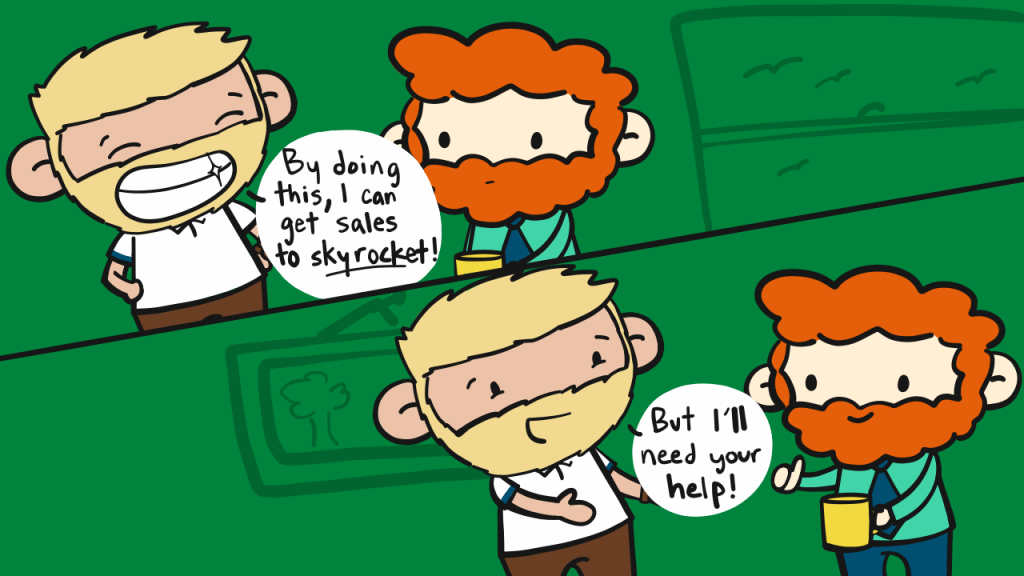Working towards a big promotion or trying to land a dream client can make it all too easy to want to bulldoze past your coworkers for your own personal gain. Having a competitive mentality in the workplace can be healthy for everyone involved, but there’s a fine line between hearty competition and taking things too far.
Understanding how to toe that line can be a key skill in determining sustained success in your field while also maintaining friendships with colleagues. Many factors are at play when balancing career aspirations and your personal relationships with coworkers – including a strong (and often overlooked) psychological influence.
The more you understand how to keep your competitive nature in check without losing your edge, the better prepared you will be to take on the challenges of your career. Luckily, there are plenty of ways that overly competitive people can still be themselves without burning bridges.
-
Understand the psychology of having a competitive nature
We all know people who are always on a sports field, playing games, and participating in any and every competition out there. The will to win is a part of natural human behavior, which has led humans to achieve many incredible things – from the space race, to the Olympics. Some of humankind’s most prized achievements, like the moon landing were the result of a perfect combination of competition and collaboration. The United States and USSR’s rivalry helped fuel the desire to outdo each other, while also fostering an environment where each side banded their best and brightest to work together to achieve a common goal. Today, international scientific communities are working together to make new lunar discoveries.
Research has shown that even on a small scale (like a company,) healthy competition helps inspire creativity, innovation, and boosts production. Many modern day companies realize the deep psychological benefits of competition among employees. This is especially true in fields like medicine – where competition provides an additional reward to helping alleviate pain and cure diseases; something that all of us can benefit from. But much like the space race, an equal amount of collaboration is necessary in order to truly get the best results in the medical field. No single person is smarter than the collective group, and when it comes to improving our health, teams of scientists and doctors must still work together to make any real progress.
Despite the need to balance competitiveness and collaboration, it’s not uncommon for the most strong-willed among us to take things too far. Some of the most driven people in business are often hardcore competitors, and striking a balance between their personality, and being someone that others want to work with can be a tremendous challenge. If you find yourself to be among this group, it’s vital to be conscious of it, and actively work to keep your competitiveness in check.
-
Ask for help
Any successful businessperson will tell you that they could not have made it on their own. The savviest CEOs employ the wisdom of trusted advisers and dedicated workforces to help turn dreams into reality. And even if you’re not the owner of your own company yet, it’s still important to be willing to use the help of your colleagues to accomplish tasks.
You’ll quickly find that not only does teamwork help accomplish tasks faster and more efficiently, but over time it will help you become a better team player. Small groups of people have a natural way of exposing each other’s social flaws. (For example – if your competitive nature leads to you bullying coworkers – chances are, that behavior will not be tolerated.) In order to find success in work groups, even competitive people need to learn the valuable skill of trusting colleagues to do their job. Is there a chance they let you down? Sure. But more often than not, you’ll find that the people you work with make for better friends than enemies.
-
Build a network of friends
One of the most overlooked, yet important aspects of success is networking. Meeting a group of like-minded people who work in your field is a social skill that takes some practice to master. However, when done right, it can help your personal career soar. Competitive people who see the bigger picture of success have trained themselves to see others not as potential threats, but potential allies.
Building the right team of people to help you accomplish goals takes time and effort. Make a point to get to know the people you work with on a personal level, which cannot be accomplished if you simply see others as competitors. When building a network, you will learn new perspectives, business methods, and you might even make a couple close friends along the way. All these rewards from networking would be impossible to have with a close-minded, competitive mindset.
-
Harness your competitive nature for good
Although having a friendly approach is usually a great way to build relationships with coworkers, it doesn’t mean that you should completely abandon your competitive nature. Remember that competitiveness is something that exists in all of us for a reason, and when you can harness that behavior and channel it towards something constructive – like planning a volunteer event with your coworkers or starting a workplace book drive, then success won’t be far behind.
No matter how smart and competitive you are, it’s certain that you will need the help of your coworkers to accomplish your career goals. Take the time to understand the psychology behind your competitive nature, and put that into the context of what you hope to accomplish at your job. Find the right balance that works best for you, and practice keeping your competitive behavior in check. Over time, you’ll find that acting in a competitive, yet friendly manner will become second nature.



